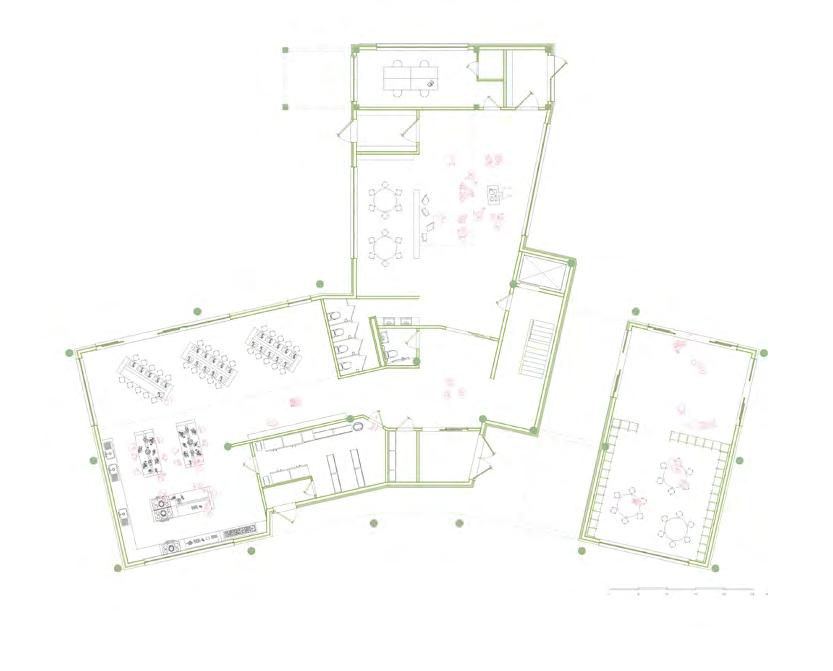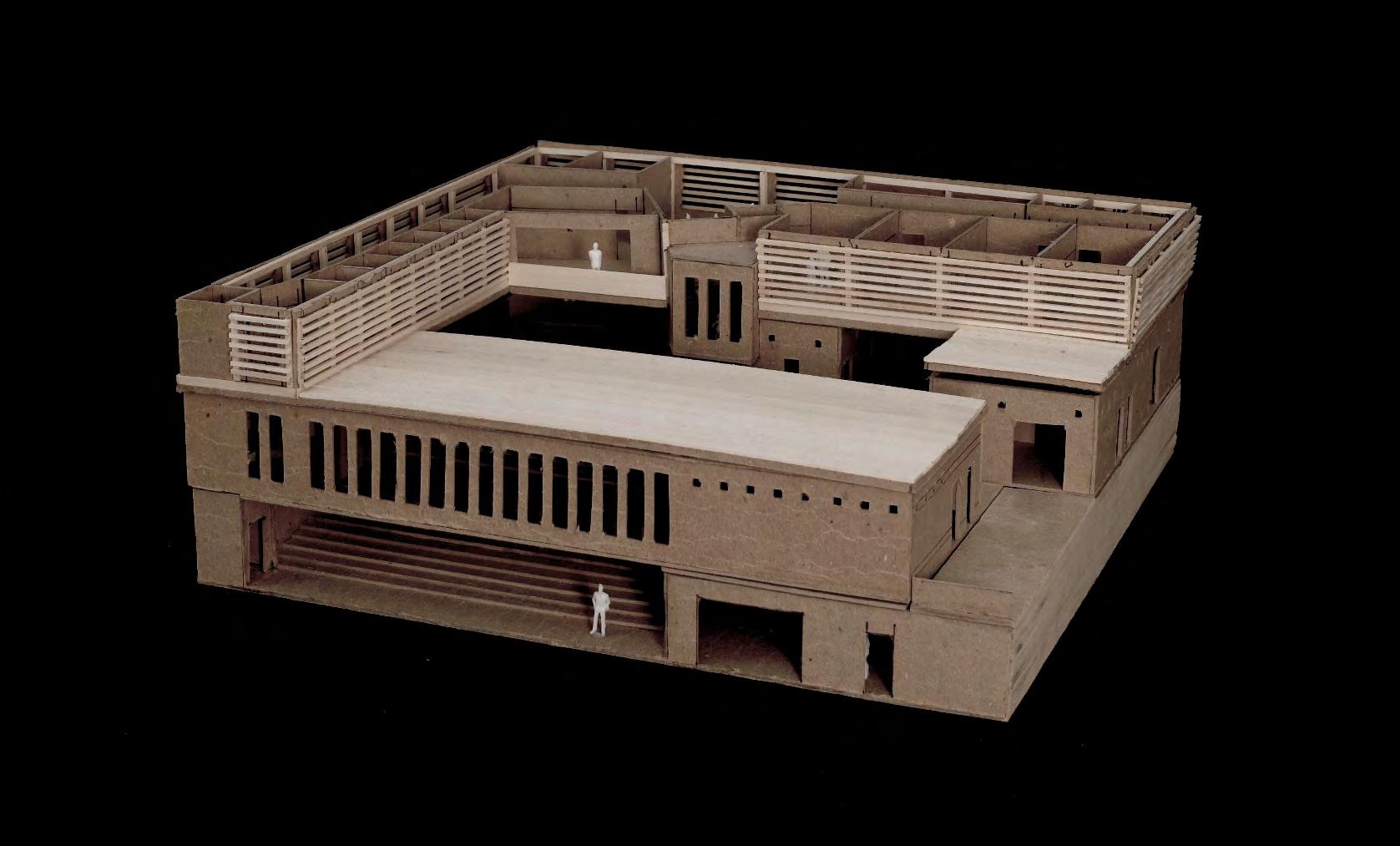
About
Kohki Hiramatsu is a senior BFA architecture student at Parsons School of Design in New York. He has previously experienced multiple cultural, hospitality and residential projects as an architectural intern at Kengo Kuma and Associates and Tacklebox Architecture PLLC.
Hiramatsu primarily focuses on depicting ordinal lives of locals in the urban scene through ink drawing, oil painting, acrylgouache painting, woodworking, photography, and printmaking as an artist. He exhibited at multiple galleries and museums in Tokyo, including Tokyo Metropolitan Museum and Wacoal Art Center. Hiramatsu received an honor from the municipality for his oil painting in 2017.
Education
2019 - Parsons School of Design, The New School
Bachelor of Fine Arts School of Constructed Environment Architectural Design
20132019 Tokyo Gakugei University
International Secondary School
International Baccalaureate Middle Year and Dimploma Program
MEXT standard curriculum
2022
Experience Exhibitions
Parsons School of Design, Teaching Assistant
Assist sophomore students under Arianna Galan Montas and Michele Busiri-Vici to conduct research on modern to contemporary houses includingie through physical and digital drawing.
Kengo Kuma and Associates, Ar chitectural Intern
Engage in developing system of facade and interior space in large scale architectural project, including cultural institute and high-rise.
Develop design of furniture pieces in small scale restaurant by referencing the general organization and system of interior design.
2021 Tacklebox Architecture, Architectural Intern
Experience the key phases of schematic design and design development for retail and small scale residential, through producing drawings in computer and by hand.
Contribute to develop the narrative and designing graphics for the brand book, package, and garments.
Attend weekly project meetings with clients, fabricators, and general contractors and organize standard office management documents.
2019 VIEWs 2019
Gallery Art Point, Ginza, Tokyo, Japan
2018
Spiral Independence Creators Festival 19
Wacoal Art Center, Minami-Aoyama, Tokyo, Japan Awards
2019 - Dean’s List
Parsons School of Design, New York, New York, The United States
2018
54th Kanagawa Art Competition, Awarded
Kanagawa Prefectural Hall Gallery, Yokohama, Kanagawa, Japan
28th Tokyo High School Exhibition, Awarded
Tokyo Metropolitan Art Museum, Ueno, Tokyo, Japan
English
Japanese
Mandarin
German
Software Skills
Rhinoceros
AutoCAD
Vectorworks
Enscape
V-Ray Languages
Lumion Blender
Unity3D
Adobe Creative Cloud
Microsoft Office
Windows OS
Mac OS X


Food Sharing
Mott Haven, New York, United States
An adaptive reuse of the existing daycare center focuses on agriculture and culinary education for children. The program chose East Side Housing Settlement, Fresh Direct, and Local Community Gardens as primary stakeholders and developed under the guidance of Community Garden Assistance offered by Grow NYC.
The mission of the center is to redistribute the food resources to the neighborhood with food insecurity, and foster the awareness of preparing food with wholesome ingredients through participatory program in cooking and harvesting.
Instructor(s) Andrew Bernheimer
Critic(s)
Mark Gardner
Martina Kohler
Ann Le
David Leven
Ross Myren
Will Sheridan
Partner(s) N/A
*Alphabetical






Site Context
The South Bronx is a predominantly Hispanic and black neighborhood and is known as one of the most poverty-stricken areas in New York City, and statistics show that about 25% of residents are experiencing food insecurity. Despite the poverty in the neighborhood, Mayor Michael Bloomberg decided to build a new office and distribution center for FreshDirect, an online food retailer, with a $130m tax incentive and subsidies on the waterfront area in 2018. Munxo Lopez from South Bronx Unite accused the office’s move as a health threat to local residents.
A major challenge for FreshDirect is that its main business is food delivery service to economically affluent households outside the Bronx. Thus, it does not share the wealth with the local community, facing a serious food shortage. Food delivery services generate approximately 2% of food loss annually. The project aims to leverage the problems of food shortages and health concerns by redistributing the food loss via culinary education. Eventually, it creates a business model for large corporations to engage in the local community.



Adaptive Strategy
The existing building on the site, built in the 1960s, needs to be updated, and the thermal performance of the walls and windows is inadequate to create a comfortable space hosting a daycare program for children.
Therefore, most of the building will be rebuilt, except for the column, beam, and foundation where the mechanical room is located.
Partially beams are removed and reinforced with added column and glulam beams to break the symmetrical relationship of the program in the existing building and establish a hierarchy of public and private. While the playground on the west is privately enclosed for children, the casita and community garden on the east is openly accessible for NYCHA housing residents to gather and engage in the harvesting practice.









Narrative Reliquary
Lower East Side, New York, United States
A branch of public library for textile material, which equips a thread mill in the core and stores bobbins collections of different fiber materials on the periphery. The visitors can reserve raw material and space to explore the potential of textile fabrication. Simultaneously, it encourages cultivating a culture of learning tacit knowledge from interacting with physical archives.
The upper levels offer private space for research and conference while the ground floor is open to public gatherings.
Instructor(s) Jeremy Barbour
Kimberly Ackert
Mark Bechtel
David Lewis
Michael McDowell
Allan Wexler
Partner(s) N/A
Critic(s) *Alphabetical













Iterative Study
The volumetric massing models primarily explore spatial conditions of vessel, envelope, passage, and threshold through the combination of two to three systems.
The site is located at the miscellaneous corner of the streets on the Lower East Side in Manhattan. The south facade faces the broader street with more traffic. On the other hand, the west side is narrow and relatively quiet. The site condition is tight, and there are approximately 70 feet tall buildings adjacent to the north and east. Therefore, the intervention asks to respect for the vertical relationship with the neighbors. Additionally, The lot includes 20 feet tall of subterranean space.












System Analysis
System A Skin
The skin holds a collection of bobbins made out of various fiber materials, which people can use instantly.
System B Stem
The vertical stem at the core creates an packed, muted, and introspective area where respectively equips thread mill for fabrications.
(System C) Interstition
The interstition is space pinched between the skin and the stem, primarily acts as a passage for visitors moving through the series of events.



Monastery for Poet
Tilting, Newfoundland and Labrador, Canada
A poetic library foster the development of literary skill and ability in unknown but promising poets by providing them a space without exterior distractions for eleven months. The poets will live at thermally controlled dwelling to protect themselves from severely cold climate in Fogo Island, Canada.
The poets will be directed to compose a daily poem and they will be shared with the residents of Fogo Island over FM radio.
Instructor(s) Andreas Benzing and Peter Vos
Critic(s)
Matt Burgermaster
Mark Gardner
Martina Kohler
George Kontaroudis
Emily Moss
Partner(s) James Gross
*Alphabetical



Program and Mission
3 poets inhabit the center per 11-month period and the organization will provide transportation to the island, housing and food for the duration of the stay. The poet will be largely isolated from the outside world and isolated from modern technology so they can hone their craft in a safe environment.
Poet will write one poem a day for their stay and broadcast their daily poems over the radio, once at sunrise, a second time during sunset. They are asked to compile all their works into a single book at the end of their residency. The organization is the legal owner of any works created at the center and the book will be kept within the attached library, no online record will be made available, anyone who wishes to see the collection will have to access the library.





Passive Heating
The building is composed of post and panel system using Glulam and CLT structure to achieve a lateral support in extreme climate. The floor with additional sheeps wool batt insulation provides a sufficient thermal mass to utilize a radiant floor heating system without a layer of concrete, reducing the carbon footprint of the project. The radiant floor heating is equipped in the middle part of the residential volume where the sunken living room is situated. It creates a thermal stratification that keeps the bedroom cold and living and music rooms warm to achieve thermal delight.
The exposed structure which can be recognized in the facade is a cap, not an actual structure member. The glulam structure is covered with insulation and hidden to avoid heat transfer from the thermal bridge.










Community Musicworks
Fort Greene, New York, United States
A community center hosts an after-school program for children who live in the neighborhood to learn musical instruments. On the weekend, it opens up for potluck dining and offers free indoor and outdoor performance. The program also encourages the practice of local composers through performing premiere.
In addition, it provides a secured alternative pathway to the school by stitching two open public areas and establishing a continuous alley where children can gather and play.
Instructor(s) Emily Moss
Critic(s)
Kenneth Amoah
Jeremy Barbour
Andrew Bernheimer
Mark Hage
Marta Llor
Clementina Ruggierri
Partner(s) N/A
*Alphabetical

Site Context
The site sits on the Auburn Place at Fort Greene, Brooklyn in New York, which is on the south side of Brooklyn Queens Expressway and is surrounded by public housing named Whitman Houses and Ingersoll Houses operated by NYCHA. It is adjacent to educational program, including PS067, the Walt Whitman Branch Public Library. The building on the east, Auburn Assessment Center offers affordable medical health clinics
While the downtown of Brooklyn was redeveloped and gentrified by the rezoning promotion under Michael Bloomberg’s administration in the early 2000s, the Fort Greene area is not yet redeveloped dramatically and maintains classic cityscape. However, the community is suffered from chronic health issues due to the adjacency to the industrial district.

System Analysis
System A Cut
The cut divides the space, establishes a direct pathway to the school, and fractures the outdoor performance space.
System B Core
The core includes an accessway to enter the space and programatically divide the visitors destinations
(System C) Veil
The veil retains the vision from inside to the outside while keeping privacy for certain program including bathroom and instruments storage.


Program and Mission
Parti-prix of the program is to offer a safe space for children to commute and play. The program is organized along the periphery of the courtyard and the descending grand stairs, which are positioned in the lower half of the community center. The hierarchical relationship creates a surveillance condition and avoids the emergence of blind spots.
The primary access point is on the cellar level. It directly connects to the library for children to check out sheet music before ascending to the second floor, where the practice rooms are located. While the upper and lower levels consist of a single mass, the ground level is split into three volumes to create an interstitial courtyard condition and programmatically differentiate the destination of visitors.



Assembly
The building is framed by two by six wooden studs. Stone panels are not structural but fastened to the wall by brackets as cladding. While the bottom is a rigidly solid structure, the upper level is finished with spruce cladding to secure the permeability of light to the practice space.
The wall, roof, and slab are filled with cellulose insulation, and the roof is coated with light color mortar to avoid the concentration of heat during summer and achieve the thermal comfort of interior space. Insulation is mostly done in two layers so that it does not create an thermal bridge. The soundproof Acourstiboard laid under the decking helps absorb the sound and enables students to practice in a quiet and intimate space. It also decreases the noise transfer to the performance space, office, kitchen, and surrounding neighborhood.



Scenic Preservation
The masonry facade aims to merge the community center with the existing landscape of the neighborhood. Historically, Brooklyn was developed as an industrial district, and most buildings were constructed with masonry units. Fort Greene area is not an exception. The Walt Whitman library adjacent to the site is made out of brick in Flemish bond on the foundation of limestone and the akin facade system is used for the surrounding public housing. The construction with repetitive masonry units and rough texture visually dissolve into the neighborhood and diminishes the presence to the local community.



Textural Urbanscape
The series of textural and geometrical explorations of urbanscape drafted in pigment ink represents how perceived the scenery and social interaction. Drawings emphasized how architectural space embraces the ordinal people passing by the street.
The engagement of practice in ink drawing forms my fundamental principles of representational skills in architectural design, including rendering and orthographic drawings.
Personal Projects
Critic(s)
Miscellaneous N/A
Partner(s) N/A
*Alphabetical






